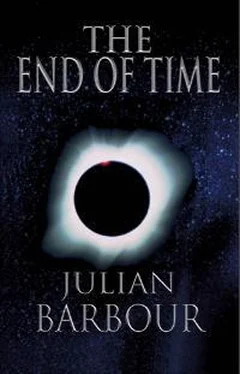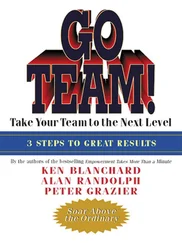Getting to Grips with Elusive Time(p. 17) The idea that instants of time are distinct entities that should not be thought of as joined up in a linear sequence is a powerful intuitive experience for at least one non-scientist. A few days after the Sunday Times published its article ‘Time’s assassin’ about my ideas in October 1998, I received by email a ‘Question for Julian Barbour’ from Gretchen Mills Kubasiak, who had read the article about me. She introduced herself with: I am merely a girl who lives in Chicago, works for a construction company and finds herself thoroughly captivated by your ideas. In fact, I have been unable to think of little else this past week.’ She asked if she could put a question to me. Well, who could resist that request? I said yes, asking if by any chance, with her first name, she had German ancestry, and commented: ‘I guess you know the German expression Gretchenfrage and its origin in Goethe’s Faust , when Gretchen asks Faust about his attitude to religion and if he believed in God. It was especially nice to get your Gretchenfrage .’ Subsequent correspondence persuades me that ‘merely a girl’ might not be the most accurate description of her, since she is a voracious reader and traveller (among much else). Some of her thoughts about time are worth passing on:
Several weeks before I read the London Times article which brought your ideas to my attention, I started having a debate with a friend of mine on traveling. He stated that when a person travels between two places, it is the time spent on the journey which makes the person able to appreciate and comprehend the final destination. Only by making a linear tour of the world and having a passage of time connect the two locations are we able to understand our final destination.
I disagreed. I have always believed that our lives are made up of individual moments that layer and co-exist with other moments, not a linear sequence of events. I did not accept his notion that time spent on a journey is relative to one’s experience at their final destination. The passage of time, that for my friend constituted the journey, did not exist for me. That is not to say that what he viewed as his journey did not consist of moments but I could not accept that they were relative to the moment of the final destination simply because they preceded it.
Despite the fact that I had these beliefs in my head, I found that I lacked the vocabulary to make a satisfactory argument on paper. It is one thing to state your beliefs and quite another to be able to back up your argument. I had developed a few descriptive examples of moments in my life that I believed began to illustrate this idea but I knew of nothing that would support them.
One of my ideas addressed my moments with Buckingham Palace. As a small child I had listened to my mother recite the poem about Christopher Robin’s visit to the changing of the guard and I stood silently alongside him and Alice. As a young girl I watched on television the newly married Prince and Princess of Wales venture forth onto the balcony to greet their public and I stood among the crowds. In both instances I was not ‘there’ and yet I was. When I actually stood in front of the palace as a teenager, the physical journey associated with that moment mattered not. What mattered were these other moments. When I stood in front of the palace, I was living not just that moment but co-existing with the other moments as well.
Then I came across the London Times article outlining your notion of the illusion of time and a spark of recognition within me was lit. Something I had always felt, but had never been able to express, was suddenly being put into words.
If, as you say, all moments are simultaneous and there is no linear sequence of events, does this not imply that the ‘length’ of a journey is completely irrelevant? If we exist in isolated moments, then the notion that time spent on a journey makes the experience cannot be true because time does not exist. If time is merely an illusion, the time spent on a journey is also an illusion.
My memories never fade. Memories from my supposed past shine as clearly as my present. I remember climbing out of my crib after a nap at 1 ½ years old as clearly as I remember getting out of bed this morning. Aren’t memories supposed to become less clear with time? These moments remain in my head as individual events. I rarely think of them in conjunction with moments that preceded or followed them. The memories in my head feel somewhat like a piece of sedimentary rock—as if these moments have all been compressed together and the connector pieces—the time that I thought held them together—has been blown away with the wind. These thoughts all exist simultaneously in my mind yet they reveal themselves to me one by one.
I think most important was my prevailing feeling of a stronger connection between moments perceived as being separated by time than between moments believed to be connected by time. What I am unclear about, however, is what causes this feeling of connection. Can there be a relationship between these moments? Not in the sense of a linear connection, but rather a feeling of empathy between them. To a certain extent, I think there is a subconscious awareness that there are these other moments occurring simultaneously and that there can be an acknowledgement between moments that are connected by subject matter.
If all moments are simultaneous, I am concurrently hearing the Christopher Robin poem being read, watching the Prince and Princess of Wales on the balcony, and standing in front of the Palace myself. My conscious mind feeds them to me in a linear sequence strung out with a bunch of other moments in an illusion of a continuous flow of action. While I am being read to, however, my subconscious is aware that I really am in front of Buckingham Palace and so a sense of really being there is brought to the Christopher Robin reading or to the Royal Wedding viewing.
This awareness that this other moment is occurring out there right now has struck me at many times. Sometimes it’s when I’m reading a book, other times I’m walking down the street listening to music. Always, however, there is the feeling that I am somewhat connected to that other moment and I can almost feel there is the chance of stepping out of this moment and into another. It is the knowledge that there is another possibility to this moment.
To a certain extent, I often feel as if we are moving towards a timeless existence. The increasing usage of the computer by people on an everyday basis is one factor heading us in this direction. At any moment, without any thought to time, we can shop on our computers, chat, read newspapers, research, do our banking, etc. Also, more and more we are creating environments in which timelessness is the objectivity. Nowhere is this more obvious than in the twentieth-century environments of the department store, the amusement park and the casino. The goal is one dream-like moment, where there is no beginning and no end—no time.
Reading these comments again three months after they came, they strike me as often very close to my position. Incidentally, I address the original Gretchen’s questions ( Glaubst du an Gott? Wie halt’s du es mit der Religion ?) in the Epilogue.
Note for physicists (p. 18): Space plays two roles in Newtonian physics: it binds its contents together to form the plurality within the unity mentioned in this section (the separations between N objects in Euclidean space are constrained by both inequalities and algebraic relations, which give expression to this unity) and if defines positions at non-coincident times. In the type of physics I am advocating, only the first property is used, as will become clear in Part 3.
Читать дальше












